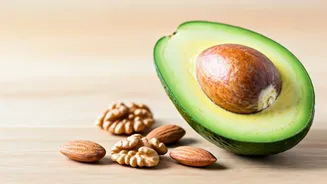Understanding HDL Cholesterol
HDL cholesterol, often referred to as 'good' cholesterol, plays a crucial role in cardiovascular health. Unlike LDL (low-density lipoprotein) cholesterol, which
can contribute to plaque buildup in arteries, HDL works by removing LDL cholesterol from the arteries, thus reducing the risk of heart disease. Elevated HDL levels are associated with a decreased risk of heart attacks and strokes. Understanding the importance of HDL is the first step in actively managing your heart health. Strategies for increasing HDL levels include dietary changes, regular exercise, and other lifestyle modifications. These can significantly improve your overall cardiovascular well-being by effectively managing cholesterol levels and promoting healthy arteries.
Avocados: Heart's Best Friend
Avocados are packed with monounsaturated fats, which are known for their ability to raise HDL cholesterol levels. These healthy fats can significantly improve the balance of cholesterol in the body. Incorporating avocados into your diet can be as simple as adding them to salads, sandwiches, or smoothies. Besides their impact on cholesterol, avocados also provide essential nutrients such as fiber, potassium, and various vitamins. The fiber content aids in digestive health, while potassium helps regulate blood pressure. The rich nutrient profile makes avocados a versatile food that contributes to overall well-being and supports cardiovascular health. Their creamy texture also makes them a satisfying and delicious addition to any meal.
Olive Oil: Culinary Champion
Olive oil, a staple in the Mediterranean diet, is another excellent source of monounsaturated fats. Regular consumption of olive oil has been linked to increased HDL cholesterol levels and reduced risks of heart disease. Using olive oil for cooking, salad dressings, or drizzling over vegetables are all easy ways to benefit. It is essential to choose extra virgin olive oil, as it retains more of the beneficial compounds like antioxidants, which provide additional health advantages. Olive oil also boasts anti-inflammatory properties that contribute to overall health. Making olive oil a regular part of your diet is a simple yet effective strategy for improving heart health.
Nuts: The Cholesterol Boosters
Nuts, such as almonds, walnuts, and pecans, are excellent sources of healthy fats and can positively impact HDL cholesterol levels. These nuts are rich in monounsaturated and polyunsaturated fats. Snacking on a handful of nuts daily can provide significant benefits. Nuts are also packed with fiber and other nutrients that support heart health. It's best to opt for raw or dry-roasted nuts, as these preparation methods preserve their nutritional value without adding extra unhealthy fats or salt. Nuts add a satisfying crunch and a wealth of essential nutrients to any diet, making them an effective addition to a heart-healthy lifestyle.
Fatty Fish: Omega-3 Powerhouse
Fatty fish, including salmon, mackerel, and sardines, are rich in omega-3 fatty acids. These essential fats not only boost HDL cholesterol but also reduce triglycerides, which are another type of fat in the blood that can increase the risk of heart disease. Omega-3s have potent anti-inflammatory properties that benefit cardiovascular health. Aim to include fatty fish in your diet at least twice a week. Baking, grilling, or steaming are healthy cooking methods that retain nutrients and enhance the fish's natural flavors. The regular consumption of fatty fish provides an abundance of heart-healthy benefits, promoting cardiovascular health.
Whole Grains: Fiber Advantage
Whole grains are packed with soluble fiber, which can help raise HDL cholesterol levels. Fiber binds to cholesterol in the digestive system, aiding its removal from the body. Including whole grains like oats, barley, and brown rice in your daily diet is highly beneficial. Start your day with oatmeal, swap refined bread for whole-grain options, or incorporate brown rice into meals. Fiber also supports digestive health and helps regulate blood sugar levels. Whole grains provide sustained energy, making them a great base for various meals and a valuable component of a heart-healthy diet. Prioritizing whole grains is a practical step toward lowering cholesterol.
Legumes: Nutritional Powerhouses
Legumes, such as beans, lentils, and peas, are excellent sources of soluble fiber, which is vital for raising HDL cholesterol. These foods are also rich in protein and other nutrients. Incorporating legumes into your meals can be easy and delicious. Add beans to soups, stews, or salads, or use lentils as a base for vegetarian dishes. Legumes are low in fat and calories, making them a filling and heart-healthy addition to your diet. These fiber-rich foods support healthy cholesterol levels and provide valuable nutrients. Making legumes a regular part of your diet can be an easy and delicious way to promote cardiovascular well-being.















